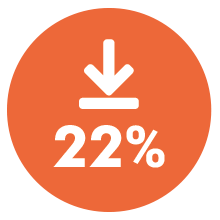
About ASSIST
ASSIST combines a ‘gold standard’ RCT with an innovative approach to reduce adolescent smoking prevalence. The most influential 12 and 13 year old students are identified and trained to work as peer supporters who then have informal conversations with their friends about the risks of smoking and the benefits of remaining smoke-free.
Aside from a reduction in smoking, schools who take part in the programme report an increase in resilience, connectedness and confidence amongst some of the students taking part.
Internationally and in the UK no other school-based smoking prevention programme has been found to be as effective. Recommended in NICE guidance, and with a QALY of around £12,700 the costs and benefits of the ASSIST intervention speak for themselves.
Customers using ASSIST benefit from high quality training and materials, opportunities to network with their peers and a rigorous Quality Assurance framework. We use this framework to maintain the fidelity of the original research in order to replicate the results. This avoids the need for customers to carry out their own evaluation.
Our offer
 Initial support and advice to determine customer resource requirements
Initial support and advice to determine customer resource requirements High quality training
High quality training Quality Assurance
Quality Assurance Programme manuals and resource boxes
Programme manuals and resource boxes Customer seminars
Customer seminars Website
Website Ongoing telephone support
Ongoing telephone support

What results can I expect?

What results can I expect?
ASSIST reduces the uptake of smoking by 22%. It was found to be effective across a range of settings including urban, rural, single sex and faith schools for up to two years after the programme had taken place.
ASSIST facts
- Over 160,000 students have now taken part in ASSIST, via more than 28,000 peer supporters.
- The evidence-based research suggests that approximately 3,250 young people would not go on to take up smoking as a result, who would otherwise have done so.
- ASSIST is now available in France.
- The programme is part of a big research project and was rolled out in Belfast and Bogotá in 2019.
- The successful ASSIST methodology is also being applied to research into other health behaviours including drugs, sexual health, and gambling.
FAQs
How does the programme work?
Influential students aged 12-13 years are identified by their peers. These students are then recruited to become peer supporters who pass on information relating to the benefits of remaining smoke free by engaging in informal conversations with friends in their year group.
How long does the programme take?
The programme takes between 10 and 14 weeks or the equivalent of a school term. This can include school holidays other than the main summer break.
How many students take part?
The programme requires a minimum of 80 students in the year group to be effective. The whole year group take part in the first session, after which approximately 18% of the most influential students become peer supporters.
What costs do I need to consider?
The majority of sessions take place on school premises, although using external staff. However, the 2 days of training must take place off-site incurring variable costs for venues, catering and transport.
Why can’t the training take place in school?
ASSIST works for a number of reasons, one of which is that the training is not based in school and is not delivered by teachers. In order to replicate the effect, as reported in the trial, the programme needs to be delivered in the same way.
Can special schools and pupil referral units take part?
Unfortunately, we do not have an evidence base to determine whether the same results would be achieved in these types of schools. It is also likely that the materials would need to be amended to ensure that they were suitable.
Accessing the ASSIST Programme
How do I access the programme?
There are 2 ways of accessing ASSIST. It can be purchased under licence by local authorities or organisations. This approach is the most cost-effective where large numbers of schools are targeted. If you plan on implementing ASSIST in a small number of schools, we also offer a pay-per-school model which has been introduced at the start of the 2018 academic year.
Why do I need to purchase a licence?
ASSIST is distributed via a licence so that the quality of the programme can be monitored and support provided. We want to ensure that the trial is replicated so that you get the same robust results.
Can ASSIST licence holders charge schools for delivery costs?
We believe, and would prefer that state schools are not charged as ASSIST is a public health programme rather than a school education programme. However, we recognise that with complex funding models, particularly those relating to academies, our customers might wish to pass on some delivery costs. In that instance, we would wish to discuss this prior to ASSIST implementation.

Quality Assurance
What form will Quality Assurance take?
Quality Assurance is made up of an observation visit, self-assessment, and student feedback. Observations will measure training against specific criteria with written feedback and discussion provided. Data from all customers will be collected and reported upon annually.
Evaluation
How will we know if ASSIST has been successful?
The programme works by replicating a successful intervention in order to replicate the results. Large scale evaluation was carried out as part of the trials that determined which elements need to be included in the programme in order to achieve a similar effect. It is not necessary to re-evaluate a programme which has been proven to be effective. This also reduces the cost to the customer.
Can a locality collect their own baseline information?
Yes. We can also provide the baseline questionnaire from the trial. However, it is worth considering that nearly 11,000 students participated in the original trial as large sample sizes are required to demonstrate the effectiveness of the intervention.
Testimonials & Case Studies
"The course was really informative, and I still remember most of the things I learned, because they were taught in an interactive and interesting way. Also, from the course, I got more confident with approaching people and handling what could be difficult situations, I use these skills every day and they're something that has already helped me a lot, including situations not related to smoking at all. In general the course was a fun, hands on experience, and I walked away knowing so much more than I did before, without even realising that I had been learning so much. The environment was relaxed and friendly which made it easy and enjoyable to learn. When I came to talk to people about smoking, I found the people I spoke to reacted well to the knowledge I showed and the way I approached them, they seemed interested and comfortable whilst discussing a potentially awkward or sensitive topic."
~ Peer Supporter - Somerset, 2013
"I used the fact about secondhand smoking the most because I’ve noticed that when it comes to others they care more about other people than themselves."
~ Peer Supporter - Somerset, 2016
"At Firrhill High we highly valued the skills developed by this group of young people and have highlighted their potential in leading future peer activities. We have used our peer supporters to lead younger classes in delivering a tobacco education lessons and are planning further to use their skills in sharing our message on tobacco with our cluster primary schools alongside Laura from Fast Forward.
We have focussed on the special skills learned by pupils during this program and alerted other staff in school to this including parental reports which now record wider skills, achievement and attainment for young people at school.
Overall, I would highly recommend the DECIPHer-ASSIST program to any school considering upskilling pupils and firmly believe that the skills developed by the young people significantly add to their portfolio of life skills. These can also be utilised in a wide range of school activities – we certainly think our future Head Girls and Boys will be selected from this group."
~ Teacher, Lothian, 2016
For further information contact:
If you want to find out more about the programme please contact:
21B Somerset Square
Nailsea, Bristol
North Somerset
BS48 1RQ
Email: info@evidencetoimpact.com


